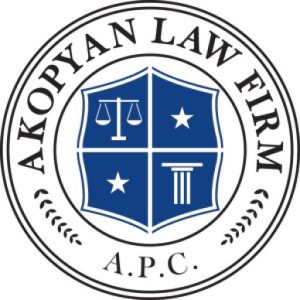Arleta Employment Lawyers
The trial attorneys of the Akopyan Law Firm A.P.C. stand ready to fight for both employers and employees in Arleta, California.
Arleta, California
 Arleta is a neighborhood of the City of Los Angeles. It is situated in the center-north section of the San Fernando Valley and is home to more than 30,000.00 Angelenos. It covers approximately three square miles, and encompasses the following zip codes: 91331, and 91224. The area of Arleta was a relatively undeveloped portion in the west of the community of Pacoima. This area remained semirural up to World War II when manufacturers expanded their operations into the valley and created more jobs. In order to accommodate factory workers, residential development increased in the area. Arleta is therefore largely residential. The Akopyan Law Firm A.P.C. is headquartered in the City of Los Angeles which is minutes away from Arleta. The Akopyan Law Firm, A.P.C. stands ready to provide legal services to both employees and employers in Arleta.
Arleta is a neighborhood of the City of Los Angeles. It is situated in the center-north section of the San Fernando Valley and is home to more than 30,000.00 Angelenos. It covers approximately three square miles, and encompasses the following zip codes: 91331, and 91224. The area of Arleta was a relatively undeveloped portion in the west of the community of Pacoima. This area remained semirural up to World War II when manufacturers expanded their operations into the valley and created more jobs. In order to accommodate factory workers, residential development increased in the area. Arleta is therefore largely residential. The Akopyan Law Firm A.P.C. is headquartered in the City of Los Angeles which is minutes away from Arleta. The Akopyan Law Firm, A.P.C. stands ready to provide legal services to both employees and employers in Arleta.
The Best Wrongful Termination Lawyer in Arleta Are Minutes Away
While Arleta thrives as a community, it is primarily recognized as a residential hub, resulting in a limited presence of lawyers or law firms within its borders. When you conduct a Google search for an “Arleta employment lawyer,” or “wrongful termintion lawyer in Arleta” the results are often populated with paid advertisements from attorneys in neighboring areas like downtown Los Angeles or Century City. This can make it challenging to identify the right attorney with the necessary expertise, as selecting solely based on paid advertisements from non-local attorneys can be a daunting task. Discovering an attorney well-versed in employment law and experienced in resolving such disputes is not as straightforward as it may initially appear. At the Akopyan Law Firm, A.P.C., each of our attorneys boasts nearly two decades of extensive experience in the field. Our legal team has consistently delivered successful outcomes for both employers and employees alike. Our firm operates on the principle of prioritizing quality over quantity. Located just a short distance from Arleta, we are ideally situated to offer residents of this community unparalleled legal representation. Whether you are an employer seeking to navigate complex employment issues or an employee facing workplace challenges, you can trust the Akopyan Law Firm, A.P.C. to provide you with the highest caliber of legal support and advocacy.
We Can Vigirously Defend Arleta Residents In Matters Involving:
Featured Article:
Constructive Discharge and Escalating Discipline in California Workplaces
📌 Key Takeaways Escalating discipline after a disability-related event or a request for reasonable accommodation can become important evidence in a constructive discharge evaluation for California workers. Discipline patterns can matter. If an employer begins issuing repeated write-ups, imposing performance improvement plans (PIPs), or changing schedules after an employee discloses a disability or requests a reasonable accommodation, those actions may become relevant to later legal claims. Timing can support an inference. When an employer starts serious discipline soon after an employee requests to engage in the interactive process, the employee may later allege the timing supports disability discrimination or retaliation. Unequal enforcement can be evidence. If an employer disciplines an employee with a disability for minor conduct that similarly situated co-workers without disabilities do not get disciplined for, that inconsistency may support an argument of selective enforcement. Medical restrictions should be addressed. If an employer receives documented medical restrictions but keeps quotas or performance standards unchanged—and then disciplines the employee for failing to meet those unchanged standards—the employee may allege a failure to accommodate or a failure to engage in the interactive process. Workplace statements can increase pressure. Comments by a supervisor suggesting the employee should “move on” or find “something less physical,” when paired with escalating discipline, may be alleged as pressure to resign rather than a good-faith effort to solve the problem. When disability-related disclosures, escalating discipline, and suggestions to leave begin to align, the paper trail—write-ups, PIPs, schedules, evaluations, emails, and texts—may matter as much as the resignation itself. ~ ~ ~ ~ ~ ~ ~ ~ ~ ~ ~ ~ ~ ~ ~ ~ ~ ~ Not every job ends with a direct termination. In some cases, an employee resigns and later alleges the employer effectively forced the resignation by creating or allowing intolerable working conditions. That allegation is commonly described as constructive discharge. In plain terms, constructive discharge generally refers to working conditions that are alleged to be so intolerable that a reasonable person would feel compelled to resign—and the employee does resign because of those conditions. The analysis is usually fact-specific. It often turns on what the employer did, when it happened, what the employer knew, and whether the employer addressed the problem when it had the opportunity to do so. In disability-related situations, constructive discharge allegations often involve patterns that develop over time, such as escalating discipline, shifting expectations, and communications implying the employee is no longer a fit after the employee discloses a disability or requests a reasonable accommodation. How Performance Management Typically Works in Hourly and Physically Demanding Jobs In workplaces such as construction, warehousing, manufacturing, retail, food service, landscaping, and delivery, performance management often involves multiple tools rather than a single annual review. For example: A supervisor may hold a verbal warning or “coaching” meeting about speed, accuracy, safety, attitude, or attendance. An employer may issue written warnings for safety violations, timekeeping mistakes, or policy violations. An employer may use attendance point systems or strict call-in rules that trigger... Read more









Millions of Dollars Recovered For Our Clients
Check Out Our Case Results



